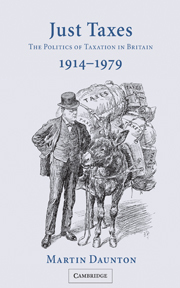Book contents
- Frontmatter
- Contents
- List of figures
- List of tables
- Preface
- List of abbreviations
- 1 The taxing state: an introduction
- 2 ‘The limits of our taxable capacity’: war finance, 1914–1918
- 3 ‘This hideous war memorial’: debt and taxation, 1918–1925
- 4 ‘Adjusting the particular turns of the different screws’: reforming the income tax, 1920–1929
- 5 ‘The great conflict of modern politics’: redistribution, depression and appeasement, 1929–1939
- 6 ‘The exigency of war’: taxation and the Second World War, 1939–1945
- 7 ‘The mortal blows of taxation’: Labour and reconstruction, 1945–1951
- 8 ‘A most injurious disincentive in our economic system’: Conservatives and taxation, 1951–1964
- 9 ‘Modern and dynamic economic policy’: Labour and taxation, 1951–1970
- 10 Rethinking taxation policy: from an opportunity state to an enterprise society, 1964–1979
- 11 ‘Highly defensible ramparts’: the politics of local taxation
- 12 Conclusion
- Appendix: chancellors of the Exchequer and prime ministers, 1908–1983
- Bibliography
- Index
7 - ‘The mortal blows of taxation’: Labour and reconstruction, 1945–1951
Published online by Cambridge University Press: 23 December 2009
- Frontmatter
- Contents
- List of figures
- List of tables
- Preface
- List of abbreviations
- 1 The taxing state: an introduction
- 2 ‘The limits of our taxable capacity’: war finance, 1914–1918
- 3 ‘This hideous war memorial’: debt and taxation, 1918–1925
- 4 ‘Adjusting the particular turns of the different screws’: reforming the income tax, 1920–1929
- 5 ‘The great conflict of modern politics’: redistribution, depression and appeasement, 1929–1939
- 6 ‘The exigency of war’: taxation and the Second World War, 1939–1945
- 7 ‘The mortal blows of taxation’: Labour and reconstruction, 1945–1951
- 8 ‘A most injurious disincentive in our economic system’: Conservatives and taxation, 1951–1964
- 9 ‘Modern and dynamic economic policy’: Labour and taxation, 1951–1970
- 10 Rethinking taxation policy: from an opportunity state to an enterprise society, 1964–1979
- 11 ‘Highly defensible ramparts’: the politics of local taxation
- 12 Conclusion
- Appendix: chancellors of the Exchequer and prime ministers, 1908–1983
- Bibliography
- Index
Summary
If we … want to remain a private enterprise country, we must not kill the goose (which is what our tax-system is doing) … The grievance, which is stated by business in terms of a shortage of working capital, would be expressed by an economist as the result of a deprivation of real resources through the mortal blows of taxation.
PRO, T171/369, B(45)3, note by Lord Keynes: Budget Committee: EPT and changes in stock values, 16 Jan. 1945The influence which taxation can have on economic development is purely negative. By its nature it cannot be creative; it can be more repressive or less according to its design in relation to the matter which is taxed. Like the brake to the vehicle, it can be applied so hard as to stop further progress, or it can be applied so lightly as to produce nothing more serious than light friction, but it can never assist in propelling the vehicle.
MRC, FBI MSS 200/F/3/S1/16/23, ‘Notes on taxation in relation to post-war planning’, 3 July 1945The national debt was a major issue at the end of the First World War; it was much less important at the end of the Second World War, reflecting the differences in war finance. Much more pressing was the need for economic recovery in order to restore Britain's international trading position.
- Type
- Chapter
- Information
- Just TaxesThe Politics of Taxation in Britain, 1914–1979, pp. 194 - 228Publisher: Cambridge University PressPrint publication year: 2002



